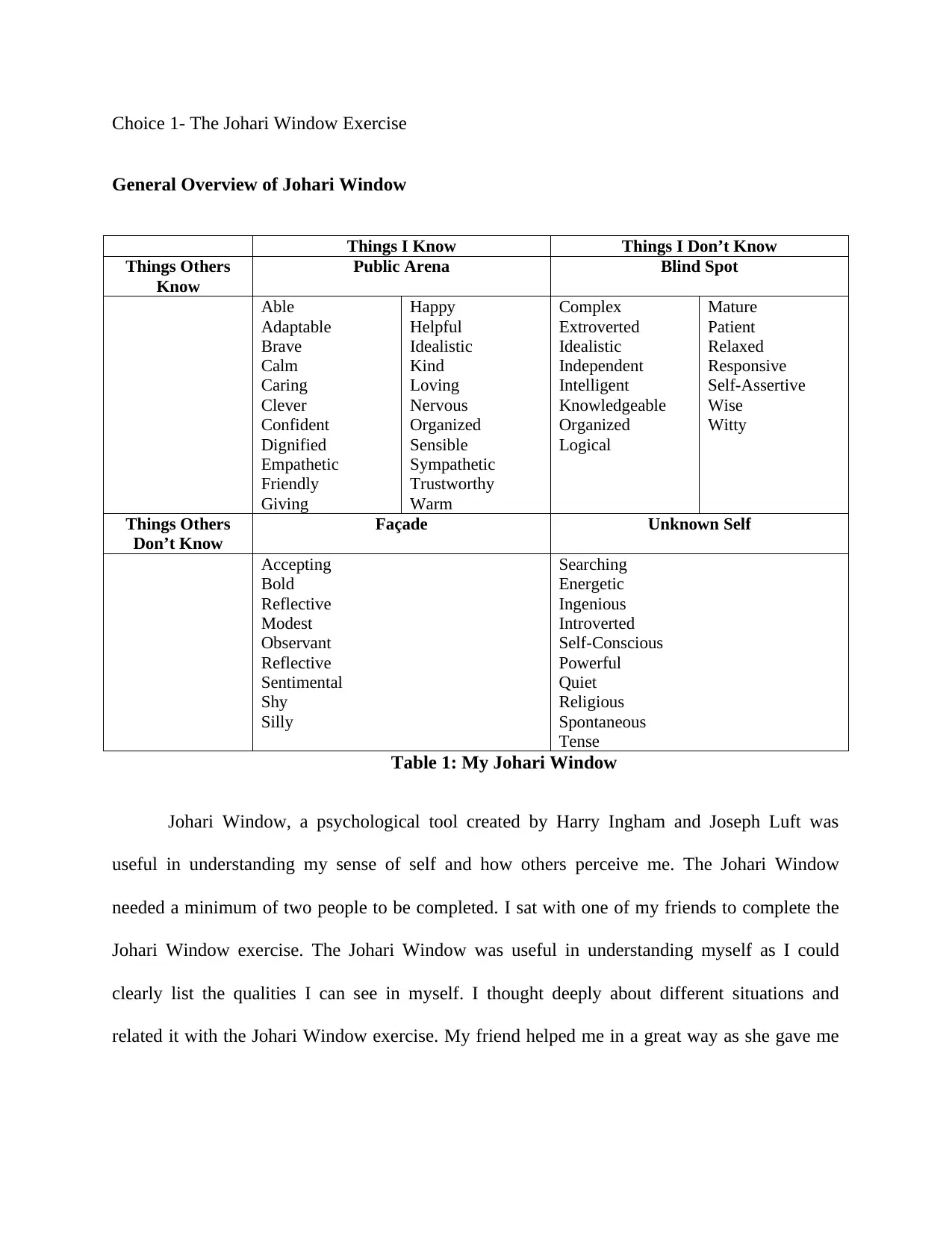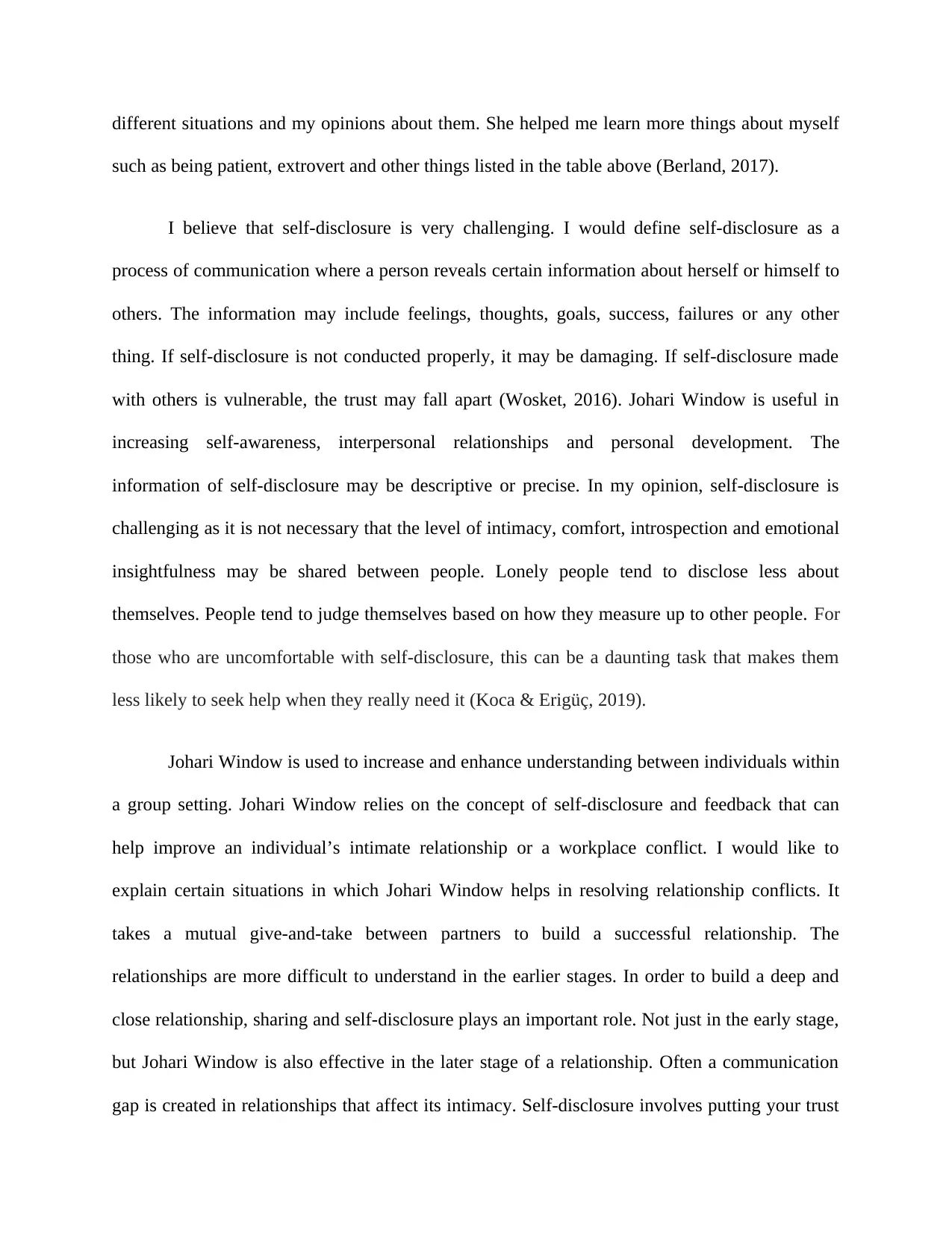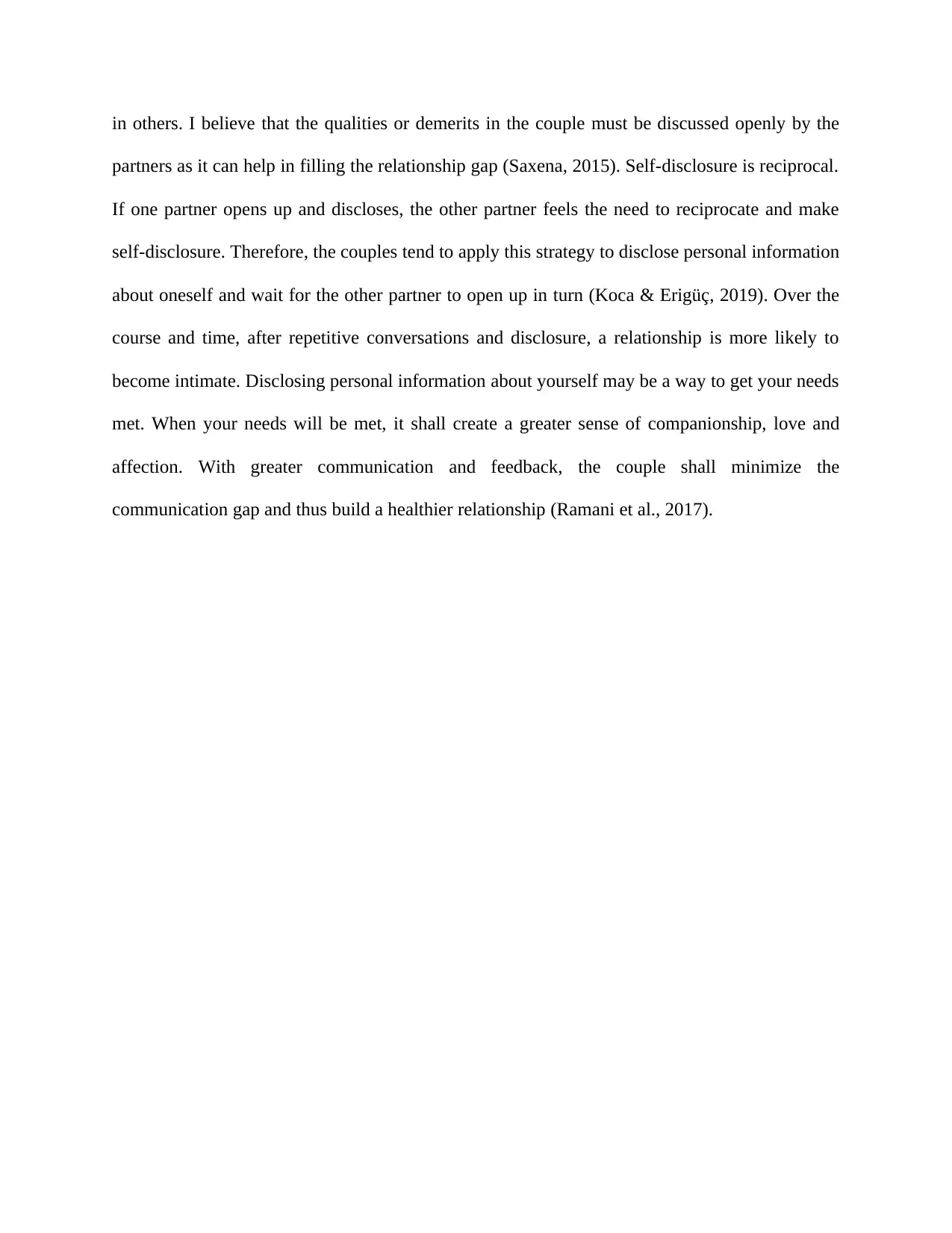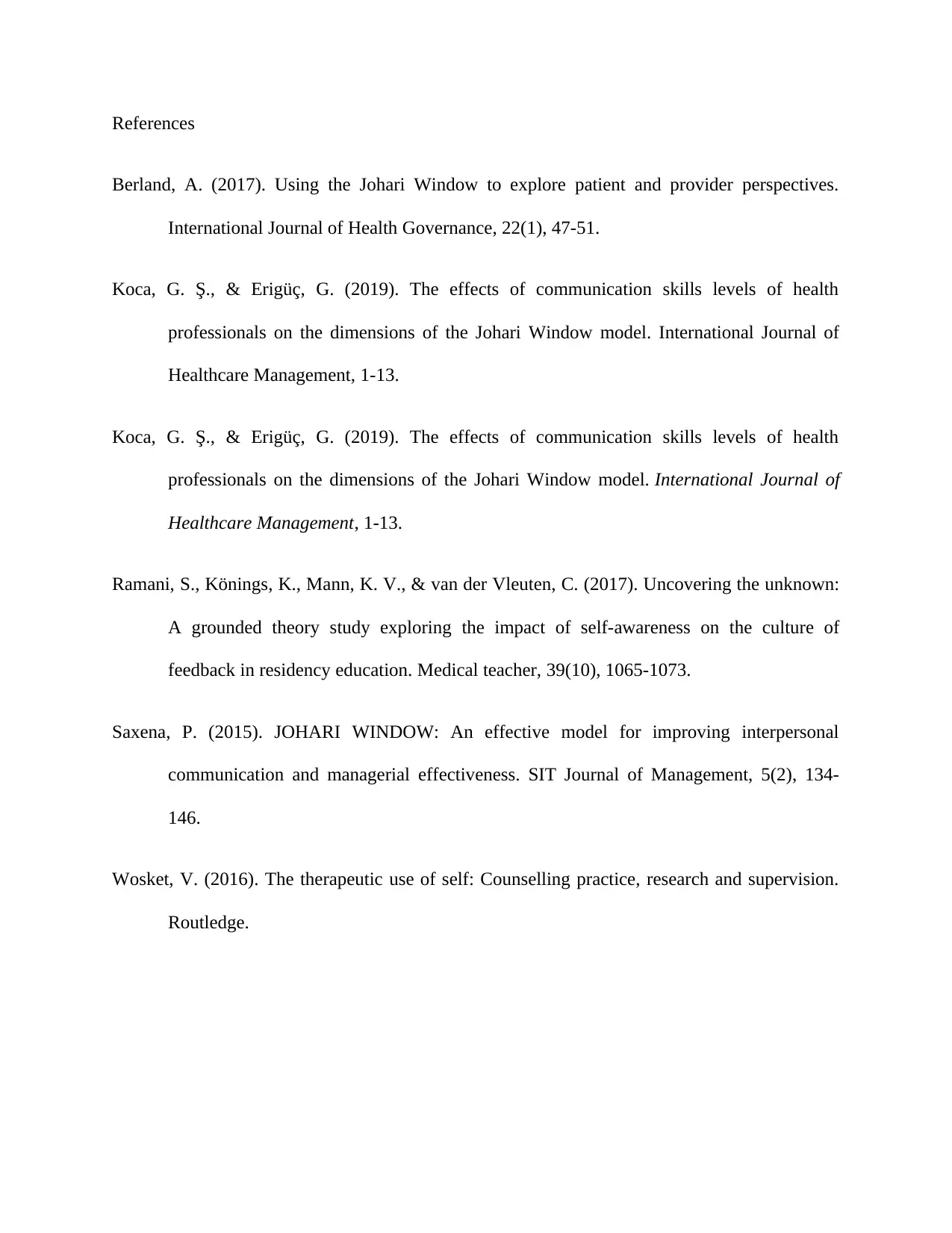PSY101: Johari Window Exercise and Self-Disclosure Analysis
VerifiedAdded on 2023/01/13
|4
|965
|37
Homework Assignment
AI Summary
This assignment is a reflection on the Johari Window exercise, a psychological tool used to enhance self-awareness and understand interpersonal relationships. The student completed the exercise with a friend, detailing their qualities within the four quadrants: open, hidden, blind, and unknown. The assignment explores the challenges of self-disclosure, defining it as the revelation of personal information, and discusses its role in building trust and intimacy. The student reflects on how the Johari Window can be applied to resolve conflicts in relationships by promoting open communication and mutual understanding. References are provided in APA style to support the analysis.

Choice 1- The Johari Window Exercise
General Overview of Johari Window
Things I Know Things I Don’t Know
Things Others
Know
Public Arena Blind Spot
Able
Adaptable
Brave
Calm
Caring
Clever
Confident
Dignified
Empathetic
Friendly
Giving
Happy
Helpful
Idealistic
Kind
Loving
Nervous
Organized
Sensible
Sympathetic
Trustworthy
Warm
Complex
Extroverted
Idealistic
Independent
Intelligent
Knowledgeable
Organized
Logical
Mature
Patient
Relaxed
Responsive
Self-Assertive
Wise
Witty
Things Others
Don’t Know
Façade Unknown Self
Accepting
Bold
Reflective
Modest
Observant
Reflective
Sentimental
Shy
Silly
Searching
Energetic
Ingenious
Introverted
Self-Conscious
Powerful
Quiet
Religious
Spontaneous
Tense
Table 1: My Johari Window
Johari Window, a psychological tool created by Harry Ingham and Joseph Luft was
useful in understanding my sense of self and how others perceive me. The Johari Window
needed a minimum of two people to be completed. I sat with one of my friends to complete the
Johari Window exercise. The Johari Window was useful in understanding myself as I could
clearly list the qualities I can see in myself. I thought deeply about different situations and
related it with the Johari Window exercise. My friend helped me in a great way as she gave me
General Overview of Johari Window
Things I Know Things I Don’t Know
Things Others
Know
Public Arena Blind Spot
Able
Adaptable
Brave
Calm
Caring
Clever
Confident
Dignified
Empathetic
Friendly
Giving
Happy
Helpful
Idealistic
Kind
Loving
Nervous
Organized
Sensible
Sympathetic
Trustworthy
Warm
Complex
Extroverted
Idealistic
Independent
Intelligent
Knowledgeable
Organized
Logical
Mature
Patient
Relaxed
Responsive
Self-Assertive
Wise
Witty
Things Others
Don’t Know
Façade Unknown Self
Accepting
Bold
Reflective
Modest
Observant
Reflective
Sentimental
Shy
Silly
Searching
Energetic
Ingenious
Introverted
Self-Conscious
Powerful
Quiet
Religious
Spontaneous
Tense
Table 1: My Johari Window
Johari Window, a psychological tool created by Harry Ingham and Joseph Luft was
useful in understanding my sense of self and how others perceive me. The Johari Window
needed a minimum of two people to be completed. I sat with one of my friends to complete the
Johari Window exercise. The Johari Window was useful in understanding myself as I could
clearly list the qualities I can see in myself. I thought deeply about different situations and
related it with the Johari Window exercise. My friend helped me in a great way as she gave me
Paraphrase This Document
Need a fresh take? Get an instant paraphrase of this document with our AI Paraphraser

different situations and my opinions about them. She helped me learn more things about myself
such as being patient, extrovert and other things listed in the table above (Berland, 2017).
I believe that self-disclosure is very challenging. I would define self-disclosure as a
process of communication where a person reveals certain information about herself or himself to
others. The information may include feelings, thoughts, goals, success, failures or any other
thing. If self-disclosure is not conducted properly, it may be damaging. If self-disclosure made
with others is vulnerable, the trust may fall apart (Wosket, 2016). Johari Window is useful in
increasing self-awareness, interpersonal relationships and personal development. The
information of self-disclosure may be descriptive or precise. In my opinion, self-disclosure is
challenging as it is not necessary that the level of intimacy, comfort, introspection and emotional
insightfulness may be shared between people. Lonely people tend to disclose less about
themselves. People tend to judge themselves based on how they measure up to other people. For
those who are uncomfortable with self-disclosure, this can be a daunting task that makes them
less likely to seek help when they really need it (Koca & Erigüç, 2019).
Johari Window is used to increase and enhance understanding between individuals within
a group setting. Johari Window relies on the concept of self-disclosure and feedback that can
help improve an individual’s intimate relationship or a workplace conflict. I would like to
explain certain situations in which Johari Window helps in resolving relationship conflicts. It
takes a mutual give-and-take between partners to build a successful relationship. The
relationships are more difficult to understand in the earlier stages. In order to build a deep and
close relationship, sharing and self-disclosure plays an important role. Not just in the early stage,
but Johari Window is also effective in the later stage of a relationship. Often a communication
gap is created in relationships that affect its intimacy. Self-disclosure involves putting your trust
such as being patient, extrovert and other things listed in the table above (Berland, 2017).
I believe that self-disclosure is very challenging. I would define self-disclosure as a
process of communication where a person reveals certain information about herself or himself to
others. The information may include feelings, thoughts, goals, success, failures or any other
thing. If self-disclosure is not conducted properly, it may be damaging. If self-disclosure made
with others is vulnerable, the trust may fall apart (Wosket, 2016). Johari Window is useful in
increasing self-awareness, interpersonal relationships and personal development. The
information of self-disclosure may be descriptive or precise. In my opinion, self-disclosure is
challenging as it is not necessary that the level of intimacy, comfort, introspection and emotional
insightfulness may be shared between people. Lonely people tend to disclose less about
themselves. People tend to judge themselves based on how they measure up to other people. For
those who are uncomfortable with self-disclosure, this can be a daunting task that makes them
less likely to seek help when they really need it (Koca & Erigüç, 2019).
Johari Window is used to increase and enhance understanding between individuals within
a group setting. Johari Window relies on the concept of self-disclosure and feedback that can
help improve an individual’s intimate relationship or a workplace conflict. I would like to
explain certain situations in which Johari Window helps in resolving relationship conflicts. It
takes a mutual give-and-take between partners to build a successful relationship. The
relationships are more difficult to understand in the earlier stages. In order to build a deep and
close relationship, sharing and self-disclosure plays an important role. Not just in the early stage,
but Johari Window is also effective in the later stage of a relationship. Often a communication
gap is created in relationships that affect its intimacy. Self-disclosure involves putting your trust

in others. I believe that the qualities or demerits in the couple must be discussed openly by the
partners as it can help in filling the relationship gap (Saxena, 2015). Self-disclosure is reciprocal.
If one partner opens up and discloses, the other partner feels the need to reciprocate and make
self-disclosure. Therefore, the couples tend to apply this strategy to disclose personal information
about oneself and wait for the other partner to open up in turn (Koca & Erigüç, 2019). Over the
course and time, after repetitive conversations and disclosure, a relationship is more likely to
become intimate. Disclosing personal information about yourself may be a way to get your needs
met. When your needs will be met, it shall create a greater sense of companionship, love and
affection. With greater communication and feedback, the couple shall minimize the
communication gap and thus build a healthier relationship (Ramani et al., 2017).
partners as it can help in filling the relationship gap (Saxena, 2015). Self-disclosure is reciprocal.
If one partner opens up and discloses, the other partner feels the need to reciprocate and make
self-disclosure. Therefore, the couples tend to apply this strategy to disclose personal information
about oneself and wait for the other partner to open up in turn (Koca & Erigüç, 2019). Over the
course and time, after repetitive conversations and disclosure, a relationship is more likely to
become intimate. Disclosing personal information about yourself may be a way to get your needs
met. When your needs will be met, it shall create a greater sense of companionship, love and
affection. With greater communication and feedback, the couple shall minimize the
communication gap and thus build a healthier relationship (Ramani et al., 2017).
⊘ This is a preview!⊘
Do you want full access?
Subscribe today to unlock all pages.

Trusted by 1+ million students worldwide

References
Berland, A. (2017). Using the Johari Window to explore patient and provider perspectives.
International Journal of Health Governance, 22(1), 47-51.
Koca, G. Ş., & Erigüç, G. (2019). The effects of communication skills levels of health
professionals on the dimensions of the Johari Window model. International Journal of
Healthcare Management, 1-13.
Koca, G. Ş., & Erigüç, G. (2019). The effects of communication skills levels of health
professionals on the dimensions of the Johari Window model. International Journal of
Healthcare Management, 1-13.
Ramani, S., Könings, K., Mann, K. V., & van der Vleuten, C. (2017). Uncovering the unknown:
A grounded theory study exploring the impact of self-awareness on the culture of
feedback in residency education. Medical teacher, 39(10), 1065-1073.
Saxena, P. (2015). JOHARI WINDOW: An effective model for improving interpersonal
communication and managerial effectiveness. SIT Journal of Management, 5(2), 134-
146.
Wosket, V. (2016). The therapeutic use of self: Counselling practice, research and supervision.
Routledge.
Berland, A. (2017). Using the Johari Window to explore patient and provider perspectives.
International Journal of Health Governance, 22(1), 47-51.
Koca, G. Ş., & Erigüç, G. (2019). The effects of communication skills levels of health
professionals on the dimensions of the Johari Window model. International Journal of
Healthcare Management, 1-13.
Koca, G. Ş., & Erigüç, G. (2019). The effects of communication skills levels of health
professionals on the dimensions of the Johari Window model. International Journal of
Healthcare Management, 1-13.
Ramani, S., Könings, K., Mann, K. V., & van der Vleuten, C. (2017). Uncovering the unknown:
A grounded theory study exploring the impact of self-awareness on the culture of
feedback in residency education. Medical teacher, 39(10), 1065-1073.
Saxena, P. (2015). JOHARI WINDOW: An effective model for improving interpersonal
communication and managerial effectiveness. SIT Journal of Management, 5(2), 134-
146.
Wosket, V. (2016). The therapeutic use of self: Counselling practice, research and supervision.
Routledge.
1 out of 4
Related Documents
Your All-in-One AI-Powered Toolkit for Academic Success.
+13062052269
info@desklib.com
Available 24*7 on WhatsApp / Email
![[object Object]](/_next/static/media/star-bottom.7253800d.svg)
Unlock your academic potential
Copyright © 2020–2026 A2Z Services. All Rights Reserved. Developed and managed by ZUCOL.





